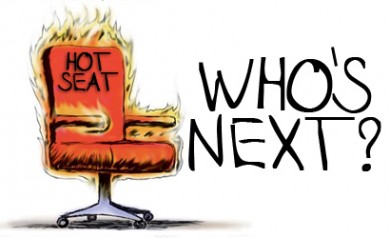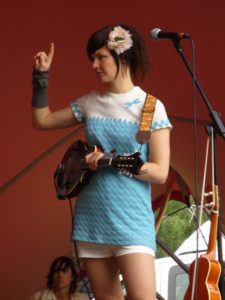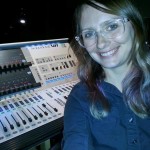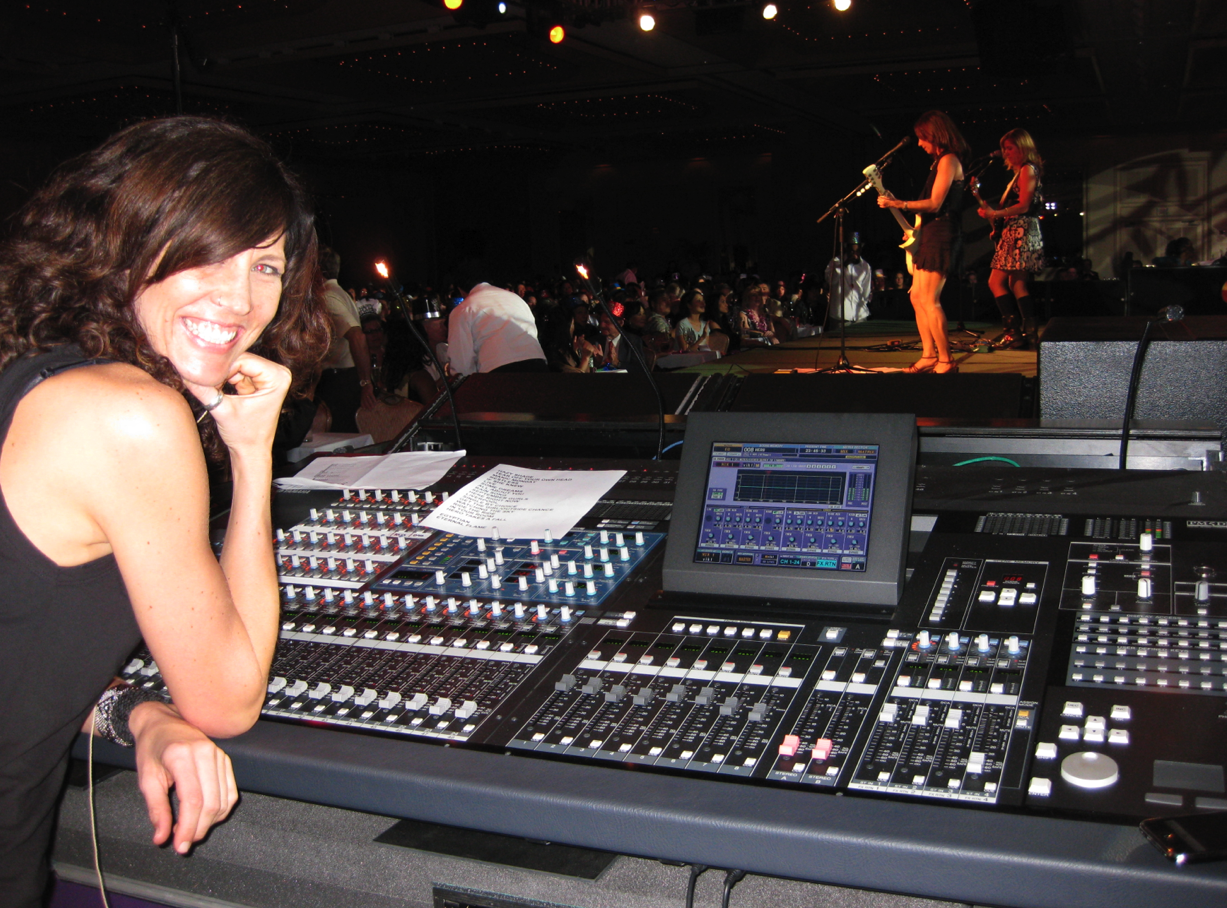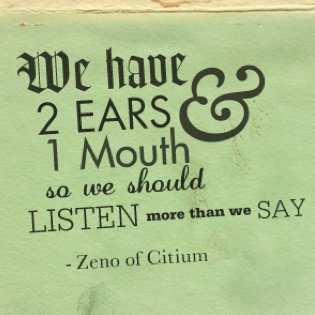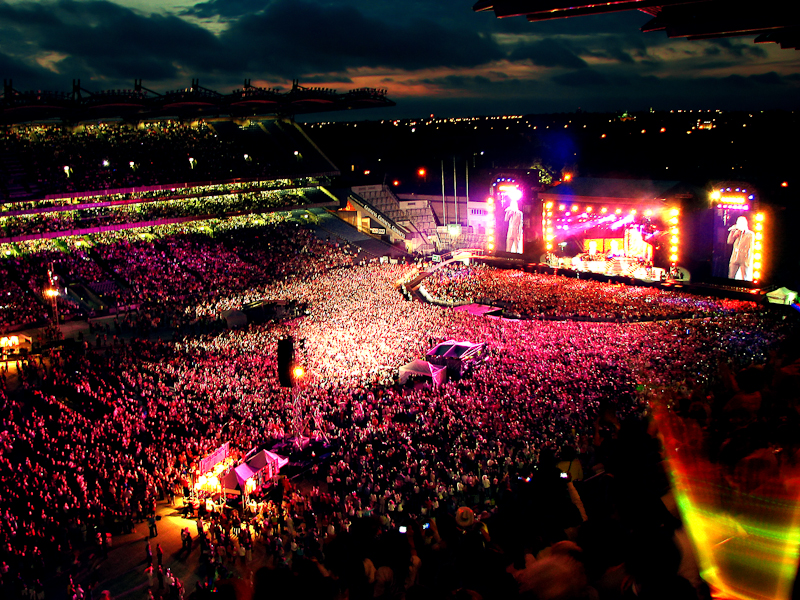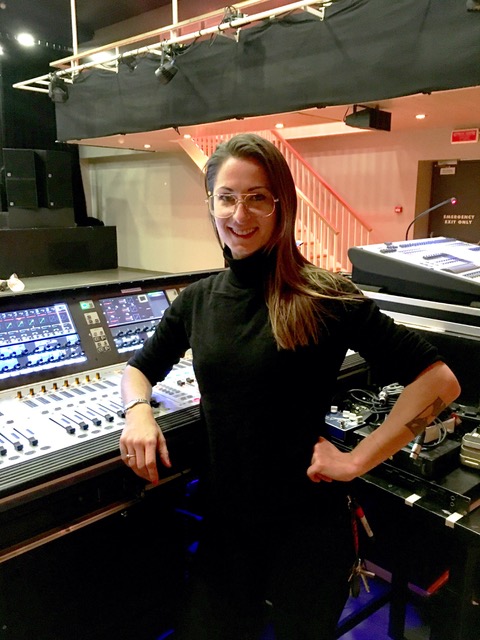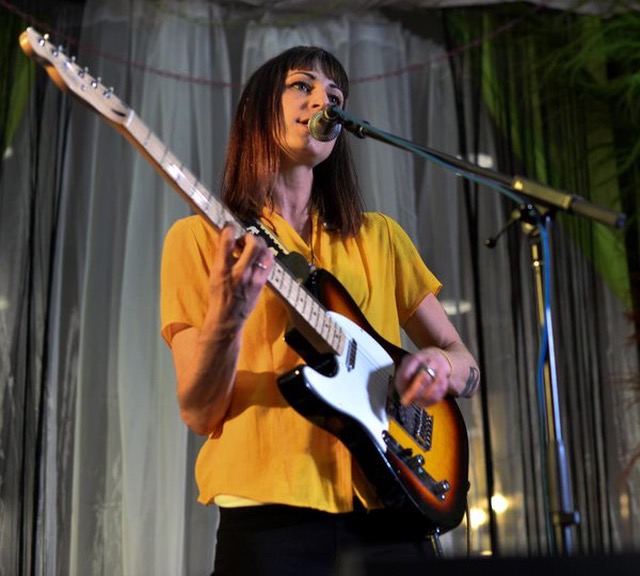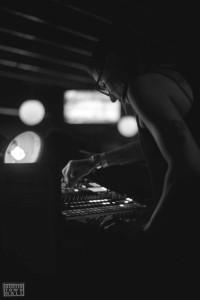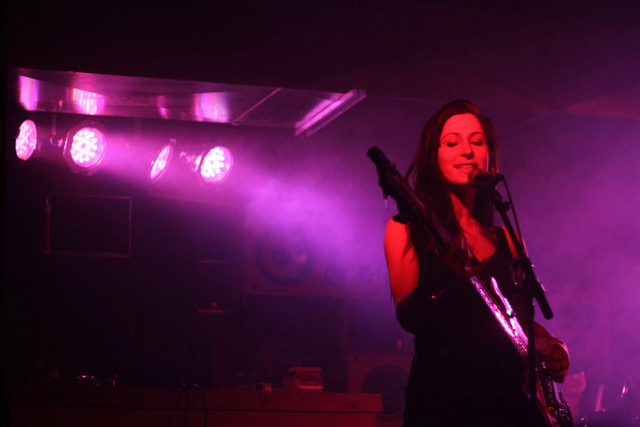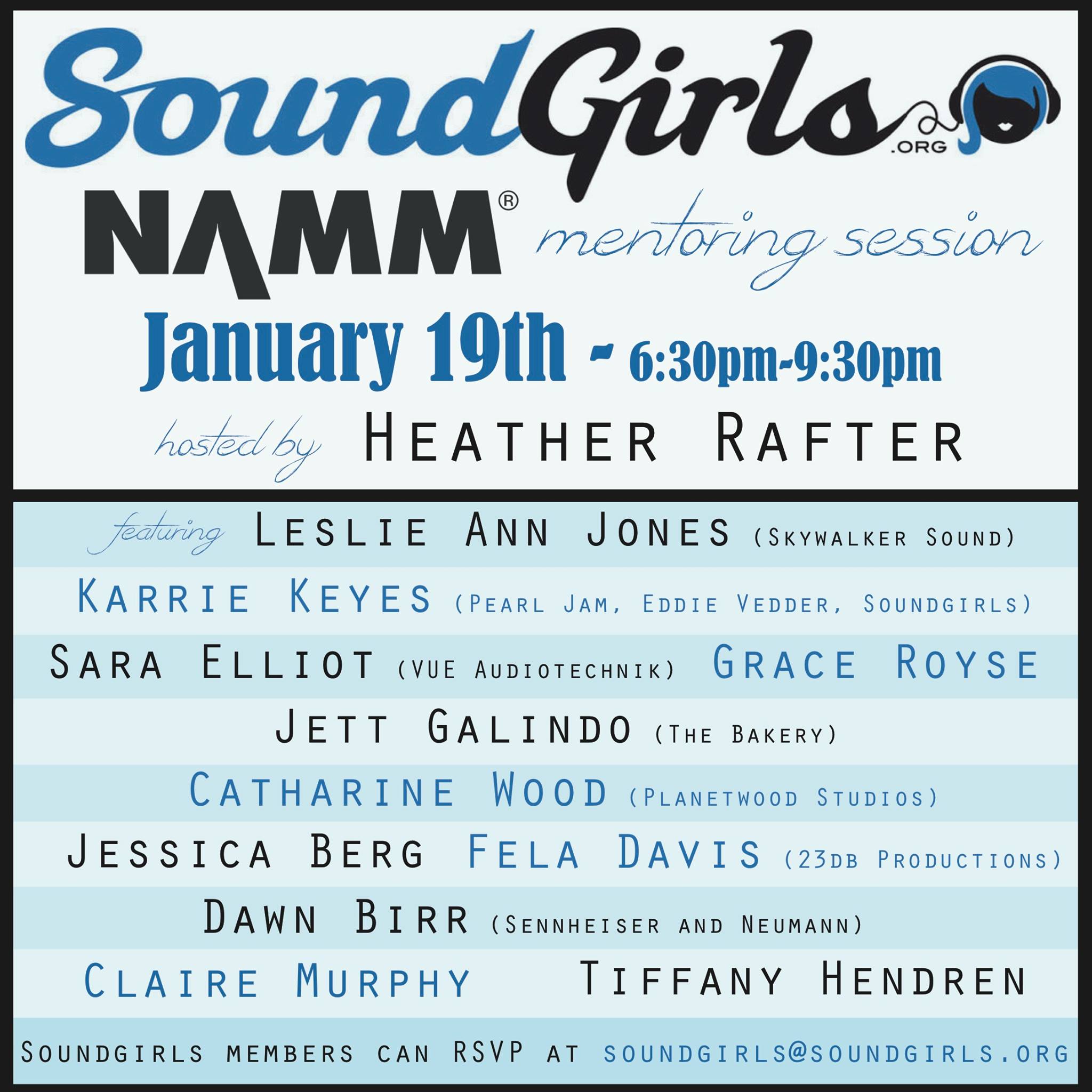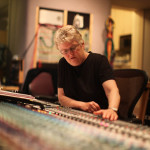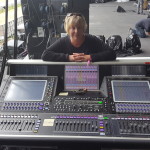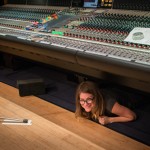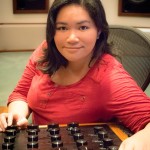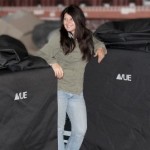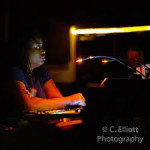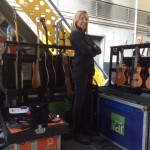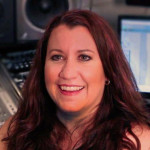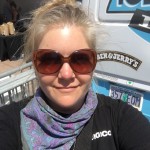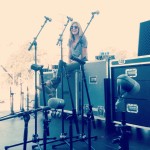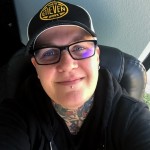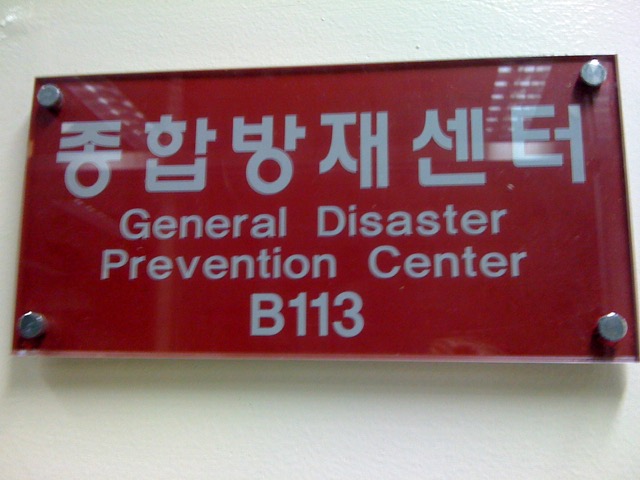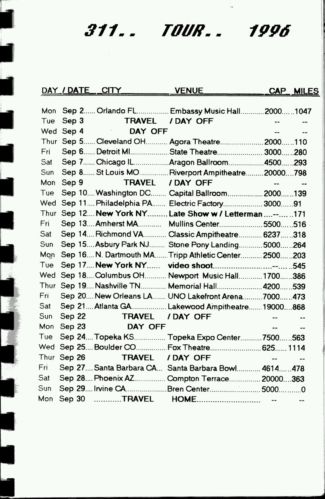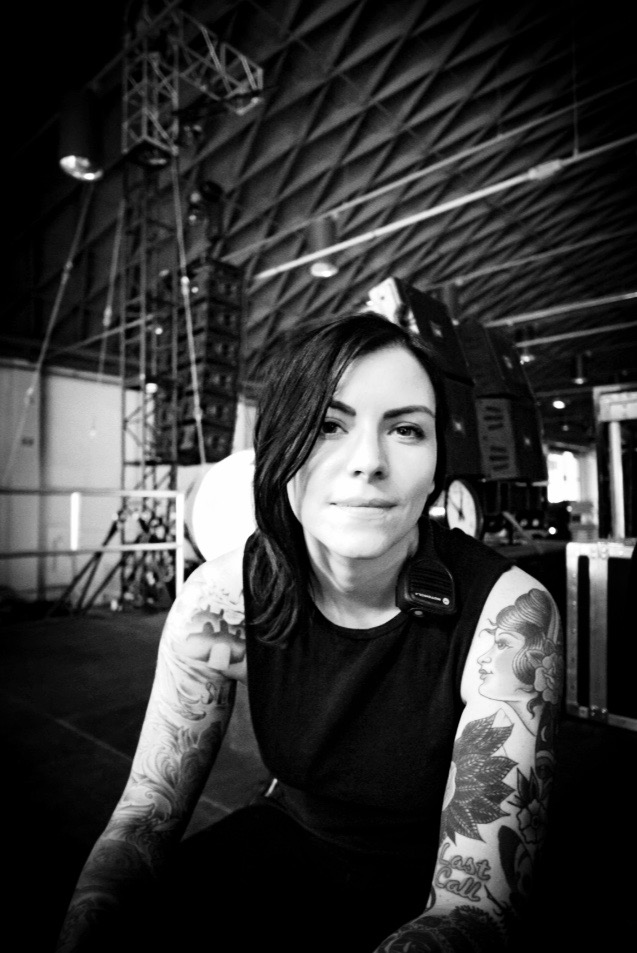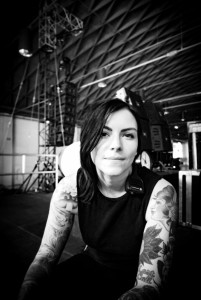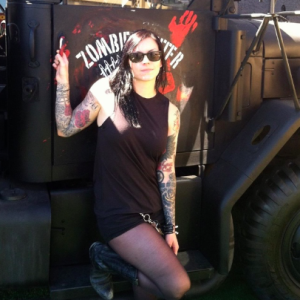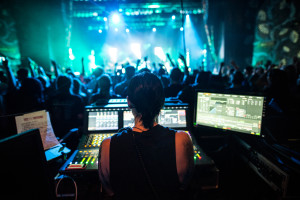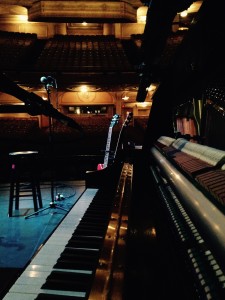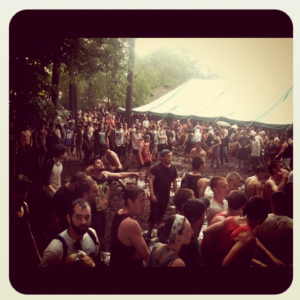Rebecca Wilson is an industry veteran, working in live sound for over 25 years. Touring solely as a monitor engineer, except for a brief stint as FOH Engineer for Flemming and John (while out with Ben Folds), she has worked for Sound Image, at Humphrey’s by the Bay and toured with Nanci Griffith, Wilco, The Bangles, and more. Rebecca is based in New York, and after finishing a 15-month project for Tibet House US, the Cultural Center for the Dalai Lama in NYC has moved into the position of head audio engineer for the TED headquarters and TED World Theatre.
Rebecca grew up in ‘cow-town Colorado and says she had limited exposure to the arts. She took piano lessons from the age of five until age thirteen when her musical training was stopped short: “I got kicked out of the piano school for pressing a million short yellow pencils into the styrofoam ceiling of the composition room. I thought they were neat wooden stalactites, but my teacher didn’t.”
When asked about what drew her to audio, Rebecca says, jokingly, “hot band guys of course.” In fact, she always had a thing for audio, spending hours using her father’s voice recorder as a child. “I’d steal the batteries from my friends’ TV remotes for it and record endless stories, listen back, and then re-record them.” When she got the chance to push her first fader, she became love-struck with the idea of being the moderator for people’s sonic experience. “Plus, getting DJ rights between sets is fun.”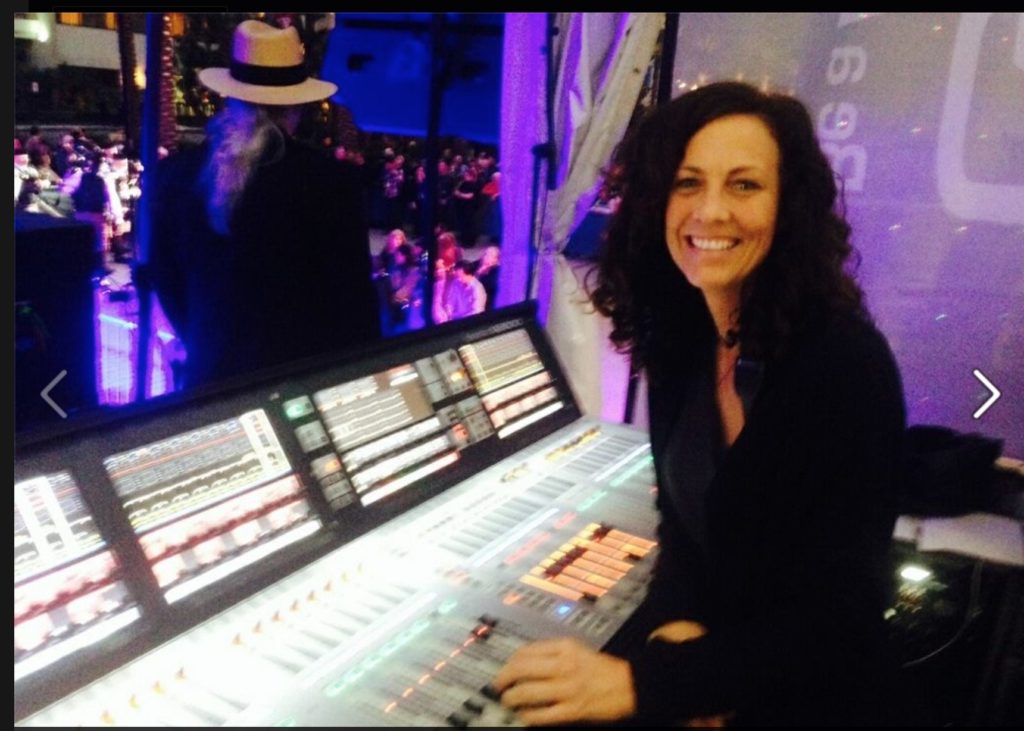
Like so many in the music industry, Rebecca fell into it by chance. During her Freshman summer break, she lived with her brother in Hawaii and worked as a cashier at the Hard Rock Cafe. It was there she met a roadie from KC and the Sunshine Band, and she asked him how she could get his job. He told her, if she could leave right now, she could have his. He mixed FOH, and they talked. Since she was attending college, he suggested she work for their campus performing arts center; learn sound, and get paid.
Rebecca answered a projectionist ad that fall when she returned to Colorado State University. It turned out to be more: the performing arts center which did the screenings had just purchased a brand-new PA in components. “I learned to use tools at that job, cut holes for the enclosures, load drivers, and wire the new racks.” She started to learn about signal path and processing and got to mix her first band, punk band Seven Seconds, in the university’s beer basement. “It was so awful and riddled with monitor feedback they stopped mid-show and ask if anyone in the audience knew how to run sound because it was obvious that she (and pointed at me) had no idea. Pin drop. I was mortified and totally hooked on understanding audio.”
After getting her BA from CSU in Communications, Rebecca worked for local venues as a stagehand, pushing speaker cabinets and loading trucks. She requested to assist the audio crew and then asked enough questions to drive the engineers crazy. She then got work at local sound companies where she attended the ‘University of Crash and Burn and Get Up Again.’ “My first real boss was really drunk all the time, and he’d let me mix even though I didn’t know what I was doing.” Rebecca has never taken a live sound class and does not support expensive schools that spit you out without real experience. She says, “all you need to know you can learn by starting at the bottom and can get paid for it.”
A year after school, Rebecca saved enough money, from stage-handing and freelance audio work, to move. She packed up her 20-year old Toyota Tercel and drove from Denver to San Diego. “I wanted to learn to surf, [it] seemed like a good plan − I’ve never liked wearing shoes.” After a week on a friend’s couch, she found a house and job working freelance for a large corporate production company Meeting Services Inc. doing hotel and AV work. She then got a house gig at a venue called ‘4th&B’ in San Diego, and it was there she met Fishbone. “They came through, liked what I did, and I left the following week on my first tour.”
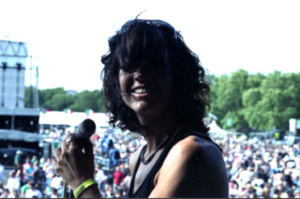 Touring through the South at 21 years old opened Rebecca’s eyes. On a bus with ten black guys and one white guy, she had a gas station attendant refuse to sell her cigarettes. “He said they were sold-out of my brand while I pointed to a pack of them behind the counter. He said, ‘those aren’t for sale.’ I had no idea what was going on.” When she told the band what had happened, they semi-laughed. “You got off the bus with us,” Angelo explained. The band told her that in the South some people saw her as worse than a ‘n*****’ because she worked for ‘n*****s.’
Touring through the South at 21 years old opened Rebecca’s eyes. On a bus with ten black guys and one white guy, she had a gas station attendant refuse to sell her cigarettes. “He said they were sold-out of my brand while I pointed to a pack of them behind the counter. He said, ‘those aren’t for sale.’ I had no idea what was going on.” When she told the band what had happened, they semi-laughed. “You got off the bus with us,” Angelo explained. The band told her that in the South some people saw her as worse than a ‘n*****’ because she worked for ‘n*****s.’
Rebecca toured with Fishbone for two years, honing her audio chops. “Mixing a club tour tends to be your first step as an engineer. Its hard knocks, different gear, various spaces, nothing is ever the same. A lot of club gear it is broken, blown and bad, but that’s where I learned the most about phase reversal and troubleshooting. Clubs tours can accelerate one’s understanding of gear, rooms, stage volume and band dynamics, and how they correlate. Invaluable.”
Over the next few years, she would work for unknown R&B artists whose labels told her that they were going to ‘blow up.’ “I learned very little about audio during that time, as there were many promises for support tour slots with large artists, but none of that ever happened. All that ‘blew up’ was my credit card bill when I couldn’t get paid.” She ended up getting a house monitor gig at Humphrey’s by the Bay through the audio company Sound Image.
At Humphreys, she got to mix folk legend Nanci Griffith, and a week later Rebecca was on her way to Nashville for rehearsals for the Newport Folk Festival Tour. Nanci Griffith had a large band with around 50 inputs, mainly playing sheds. During the tour, she met Wilco who was traveling with little production and they ended up hiring her for the run. Rebecca found it incredibly rewarding working with such amazing artists and talent. After that tour, she became the ME for The Bangles and would work with them for over ten years. Rebecca says “I love them; fantastic people and musically wonderful. Truly”.
Rebecca has just wrapped up a 15-month audio contract job as Media Director, for the Tibet House, the Cultural Center for the Dalai Lama in NYC. “It was the first 40-hour a week ‘job-y job’ that had a title beyond ME, FOH, A1 or A2.” She took 30 years of analog recordings and converted them to digital, installed a webcasting system in their event space, and started broadcasting meditation classes and programming. “I was relatively unqualified for the archiving bit − I’ve never been a DAW whiz −, so I researched best practice for file transfers and archiving. I also learned audio compression and ID tagging for the web, along with streaming and international content delivery networks. The webcasting part felt more familiar; it was live, mixing audio and switching cameras for broadcast. There were some initial hiccups; internet bandwidth issues, audio aux crapping out. I learned that webcast audiences are less frustrated if the picture is compromised rather than the audio: if they could still hear the webcast fine, the phones didn’t ring with complaints. Of course, I’m a bit partial, but I believe that audio is more important than lighting and/or picture. Radio had told visual stories before TV was even on the scene.”
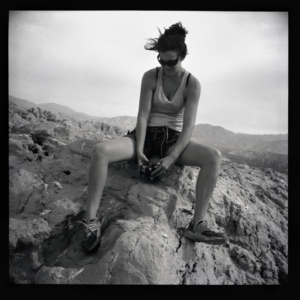 When asked what her goals are now, Rebecca says that “beyond living through President Trump, I’d like to keep building my skills in still photography. My website is www.rebeccawilsonstudio.com I also write screenplays.”
When asked what her goals are now, Rebecca says that “beyond living through President Trump, I’d like to keep building my skills in still photography. My website is www.rebeccawilsonstudio.com I also write screenplays.”
What, if any, obstacles or barriers have you faced?
“I’ve put more pressure on myself to measure up as a ‘soundman’ than any man ever has. The biggest obstacle I’ve ever faced is my own inner critic, feelings of inferiority, and the fears of being broke, old and alone (but with a good pair of headphones of course).”
How have you dealt with them?
“I had to come to terms with the fact that just because my life looks different than most, it doesn’t mean there’s anything wrong with me or my decision-making. I still consistently throw myself into new, unfamiliar aspects, [both] audio and things in general. It’s a terrifying and sometimes stressful way to live, but I hear people express they’re afraid to die with a lot of ‘should have’ regrets, that they didn’t step off the pavement. I’ll certainly die with a few extra stress wrinkles, but smiling. No regrets. I would encourage anyone reading to not fall for the safety net trap. Of course, be smart, but if you’re on the fence, just do it. No personal richness or outward success ever comes without some humiliation and failure. Learning to use it positively is key.”
What advice do you have for other women, and young women, who wish to enter the field?
“Speaking from a live concert sound perspective, check your motive for going into audio engineering. Is it sensational-based? Or do you have an affinity for sound waves moving through the air? You don’t need to know until you get a little experience in it, but it’s something to think about. I feel a strange timelessness and focus while listening to music critically. Early on, I think I heard the world more than saw it. My stuffed animal horse was named Beep.
I’d like to add that when you mix and tour, there’s a good chance you’ll be tired a lot. The job is physically demanding, lots of lifting, pushing and standing, [and] lots of bruises and cuts if you’re me. The other day my boyfriend joked that I have construction worker hands. I went into the bathroom and cried a little. Then I gave him a kick-ass back massage. I love my hands and ears. They’ve enabled me to travel the world.”
What do you like best about touring?
“Seeing the similarities of how humans inhabit the Earth.”
What do you like least?
“Who I became on tour (1996-2000 at least). Touring gave me a professional excuse to separate from all the people and circumstances I didn’t want to deal with at home. I lived with complete impunity and isolation (it was the late 90’s, before cell phones). It turned out, being ‘on tour’ and ‘unreachable’ didn’t bring me any peace or freedom like I’d hoped because the problems weren’t back home. The problems were how I saw the world, more specifically, what I like to call the ‘golden carrot syndrome’: the belief that the better place or thing was just around the next corner. I was always in mal-contentment mode; I wasn’t a fun person. I lived on cigarettes, red vines, coffee, booze and breath mints. I’d become the touring ‘shot-out’ cliché by [age] 26. I took a year-ish off in 2001 to regroup. I was happy to find that the problem was me and not everyone else. I went back to touring without all that baggage. Two different lives doing one profession. Lucky. Wouldn’t change a thing.”
What is your favorite day off activity?
“I’d made a rule early on not to get aboard anything that went faster than 15mph on off-days. I walk a lot, lay on grassy mounds in quiet parks, I like to troll a place without a plan, try to get a feel for how it connects to the last place we just were. See art museums and do yoga. Whatever is quiet.”
Must have skills:
“Tenacity and kindness. If you’re a woman, don’t get hard and crass. Leave that to men.”
Favorite gear:
“Sennheiser G-series in-ear monitors with 3D molds by Sensaphonics. They change lives. The Westone’s triple driver pair is good too.”
Parting Advice:
“If you’ve read this far, you’ll probably really make a great soundperson. You’ve got dedication and longevity. Here are some non-technical things I’ve found that matter more than audio mathematics and algorithms ever have:
“The most valuable thing I can give a musician besides a feedback-free stage is my full attention. Try to always be scanning the stage for someone who needs something. During soundcheck I walk the stage and stand right behind them, listening from their perspective. If the band doesn’t soundcheck, and they struggle to hear. After the show ask about the experience. Be prepared for criticism, but communication is fundamental as an ME. If you don’t understand what they’re describing, keep asking questions. Lots of musicians lack the vocabulary beyond ‘tin can sound.’ Help them find words for what they are experiencing. If you can’t dial in a solution, look into a new piece of gear for it.
“Also keep in mind, some days nothing will sound good to them (or you) − don’t reset the console mid-tour because someone is hungover. The greatest enemy of ‘good’ is ‘better.’ If everyone is happy onstage, I don’t turn knobs, especially if I think ‘this will make it a little better.’ It’s a rabbit hole and changing things mid-song can really upset things onstage. Let the artist guide you. Once I get it up and running, on a good day, there’s not much to do.
“If things go wrong, GO OUT ONSTAGE. ME’s are usually listening in closets, as far as onstage crew. It’s our job. If the problem isn’t in your department, get the person who is responsible, if it is your department, trust that you’ll know a solution. One always comes. It’s a bit of gypsy stage magic. Don’t let the artist struggle out there alone.
“ME’s are there for mainly two reasons: One, to allow artists to connect to their instrument and what their bandmates are playing. Two, to give them [the artist] the sonic personal confidence to stand in front of a HUGE CROWD of people who paid a lot to hear them. Imagine how you’d feel if people shelled out a lot of money to hear you play and you couldn’t even hear what you are playing. I’ve been hit in the head with flying drumsticks and bottled waters because I was staring at the console for minutes on end. It’s a serious thing they and you are doing. Artists are out there totally exposed. It’s your job to give them clothes. Even if I have a bad feeling about a certain gig or day, I try and be calm when they come onstage; it transmits to them. Don’t do crack or Red Bull.
“Lastly, always have a spare vocal mic with a long cable. Always. And check it.
“Over and out − Rebecca.
“P.S. when you’re starting out, never call a cable a cord.”
More on Rebecca
Driven To Excellence: Inside The World Of Multifaceted Audio Professional Rebecca Wilson
Rebecca Wilson on Roadie Free Radio
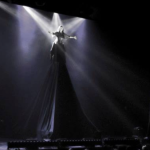 Loanne Wullaert Venue Manager and Owner of the Phoenix a Stagehand Labor Staffing Company
Loanne Wullaert Venue Manager and Owner of the Phoenix a Stagehand Labor Staffing Company